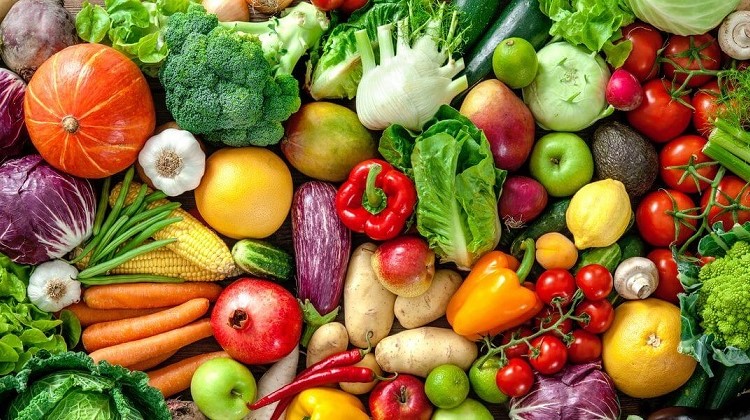Strengthening one’s skeletal system through the building of healthy bones is crucial.
Children, teenagers, and young adults are the prime years for mineralization of the skeletal structures. However, by the age of 30, most people’s bone mass is considered to be at an optimal level.
Bones become more brittle and break easily if not enough bone mass is created before you reach 30 years of age or if you experience bone loss as you age.
Luckily, there are dietary and lifestyle choices that can aid in the development of strong bones and their preservation well into old age.
Here are seven tried-and-true natural ways to build healthy bones that you can adopt today.
#1. Make Sure You Have Enough Vegetable
Your bones will thank you for eating your vegetables.
They’re rich in vitamin C, a nutrient that helps the body make new bone cells. It has also been suggested that vitamin C’s antioxidant properties may help prevent bone cells from becoming damaged.
Bone mineral density, also known as bone density, appears to be increased by vegetable consumption.
The density of your bones is a quantitative indicator of the mineral content of your skeleton. Low bone density is a hallmark of both osteopenia (low bone mass) and osteoporosis (brittle bones).
Studies have found that children whose diets are rich in both yellow and green vegetables have higher rates of bone mineralization and young adults whose diets are rich in these vegetables have higher rates of bone mass maintenance.
Vegetable consumption has also been linked to positive outcomes for women of a certain age.
The risk of osteoporosis was reduced by 20% in a study of women over the age of 50 who ate onions more frequently than those who ate them less frequently.
Increased bone turnover, or the rate of bone resorption which is followed up by new bone replacement, is associated with an increased risk of osteoporosis in older adults.
In one study that ran for three months, women who consumed the equivalent of nine servings of parsley, cabbage, broccoli, or other plants rich in bone-protective antioxidants witnessed a decrease in bone turnover.

#2. Begin Strength Training
Specific physical activities can aid in bone development and maintenance.
Weight-bearing or high-impact exercise is great for bones because it encourages the body to generate new bones.
The amount of bone formed during the years of peak bone growth has been shown to increase with this type of activity in children, including those with type 1 diabetes.
Additionally, it can be very useful for warding off bone loss in the elderly.
Research on older men and women who engaged in strength training found improvements in bone size, bone strength, and bone mineral density, as well as decreases in markers of inflammation and bone turnover.
One study, however, found that even after nine months of the most strenuous weight-bearing exercise, older men saw no increase in bone density.
In addition to fostering muscle growth, strength training has other positive health effects. Younger and older women, as well as those with osteoporosis, osteopenia, or breast cancer, may also benefit from strength training as it can help protect them from bone loss.
Although both resistance training and weight-bearing exercise increased bone density in several areas of the body, only resistance training increased bone density in the hip, according to a study of men with low bone mass.
#3. Consume Enough Protein
In order to maintain strong bones, it’s crucial to consume an adequate amount of protein. In fact, around 50% of all bone consists of protein.
Having a low protein intake has been shown to reduce calcium absorption and may also affect bone formation and breakdown rates, according to a study.
However, one potential drawback of high-protein diets is the potential loss of bone-building calcium as a result of the body’s attempt to neutralize the acidity of the blood.
Notwithstanding, research shows that this is not the case for people whose daily protein intake is up to 100 grams, so long as they also consume a healthy amount of calcium and a variety of plant-based foods.
There is evidence that higher protein intake improves bone density, especially in women of reproductive age.
Higher protein intake was associated with lower risk of forearm fractures and significantly higher bone density in the hip, spine, and total body in a large, six-year observational study of over 140,000 postmenopausal women.
There is also some evidence that low-carb diets with a higher percentage of calories from protein are better for bone health than standard low-fat diets at maintaining bone mass during weight loss.
Researchers found that after a year on a calorie-restricted diet, women who consumed 86 grams of protein daily lost significantly less bone mass in their legs, hips, spine and arms than those who consumed only 60 grams of protein daily.

#4. Have Plenty Of Vitamin D And K
Building strong bones requires a lot of vitamin D and vitamin K.
Among its many benefits to bone health, vitamin D aids in calcium absorption. Protecting against bone diseases like osteopenia and osteoporosis requires a blood level of at least 30 ng/ml (75 nmol/l).
As a matter of fact, research has shown that both children and adults who do not get enough vitamin D have lower bone density and are more likely to experience bone loss.
Vitamin D deficiency is widespread, affecting an estimated one billion people worldwide.
If you spend enough time in the Sun and eat foods like cheese, liver, and fatty fish, you might get all the vitamin D you need. Many people, however, need to take vitamin D supplements of up to 2,000 IU per day to keep their levels where they should be.
Vitamin K2 improves osteocalcin, a protein crucial to bone formation, and thus promotes bone health. This alteration allows osteocalcin to bind to bone minerals, which in turn aids in preventing calcium loss.
MK-4 and MK-7 are the most common forms of vitamin K2. Meat, eggs, and liver, all contain trace amounts of MK-4, but only in a metabolite form. MK-7 can be found in fermented foods like natto (a soy product), sauerkraut, and cheese.
The MK-7 supplement increased vitamin K2 blood levels more than the MK-4 supplement did in a small study of healthy young women.
Bone density and osteocalcin modification are both improved by vitamin K2 supplementation in children and postmenopausal women, according to other research.
In a study involving women aged 50 to 65 years, those who took MK-4 kept their bone density while those who took a placebo saw a significant drop.
On the other hand, a 12-month study comparing women who took natto to those who did not, found no difference in bone loss.
#5. Eat High-Calcium Foods
Calcium is the most abundant mineral in bone tissue and is therefore crucial to bone health.
It is essential to consume calcium daily to protect your bone structure and strength because old bone cells are constantly being broken down and replaced by new ones.
Calcium has a Recommended Daily Intake (RDI) of 1,000 mg, but adolescents need 1,300 mg and women over 50 years need 1,200 mg per day.
However, calcium absorption varies widely from one person to the next.
Calcium intakes above 500 milligrams are associated with much lower absorption in the body compared to lower intakes.
To ensure adequate calcium intake, it is advisable to derive your required calcium levels from calcium-rich food consumed throughout the day. While calcium supplements can increase your calcium levels, it is preferable to get your calcium requirement from food sources rather than supplements.
Calcium supplements were associated with a 22% higher risk of heart disease in a recent 10-year study involving over 1,500 participants, while high calcium intake from food sources were seen to reduce the risk of heart disease overall.

#6. Don’t Ignore Magnesium and Zinc
Bone health depends on a number of minerals, not just calcium. Magnesium and zinc are two others that contribute greatly to the good health of your bones.
Magnesium is essential in the activation of vitamin D, which in turn increases calcium absorption.
Researchers observed that among more than 73,000 women, those who consumed 400 milligrams of magnesium daily had a higher bone density of about 2%.
Magnesium is a mineral that is present in most foods albeit in trace amounts, but only a select few foods are good dietary sources of magnesium. Magnesium glycinate, citrate, or carbonate may also be useful as a dietary supplement.
Zinc is an essential trace mineral that can only be obtained in extremely minute doses. It contributes to the mineral content of bones.
Zinc also encourages the development of bone forming cells while at the same time curbing the overwhelming breakdown of your bone structure.
Zinc supplements have been shown to aid in both the development of healthy bone tissue in children and the preservation of bone density in adults of advanced age.
Zinc can be found in food sources, such as; spinach, oysters, shrimp, pumpkin seeds, beef, and flaxseeds.
#7. Have More Omega-3 Fats
The anti-inflammatory effects of omega-3 fatty acids are well-documented.
Additionally, they have been shown to protect against bone loss that occurs naturally with aging.
Keeping the ratio of omega-6 to omega-3 fats in your diet at a healthy level is just as important as getting enough omega-3 fats in your diet.
Over 1,500 adults between the ages of 45 and 90 years participated in one study, and those with a higher ratio of omega-6 to omega-3 fatty acids in their diets had a lower bone density than those with a lower ratio.
Maintaining a ratio of omega-6 to omega-3 of 4:1 or lower is highly recommended.
In addition, while the majority of research has focused on the advantages of long-chain omega-3 fats found in fatty fish, a controlled study discovered that omega-3 plant sources helped reduce bone breakdown and increase bone formation.
Some of the best food sources of omega-3 fats are plant-based and include walnuts, flaxseeds, and chia seeds.

In Conclusion
Maintaining strong bones is crucial at any age. However, people often take healthy bones for granted because they don’t experience any symptoms until the condition is quite advanced.
You can start early on the path to strong bones by adopting some of the many dietary, lifestyle and bodybuilding tips mentioned in this post today.


